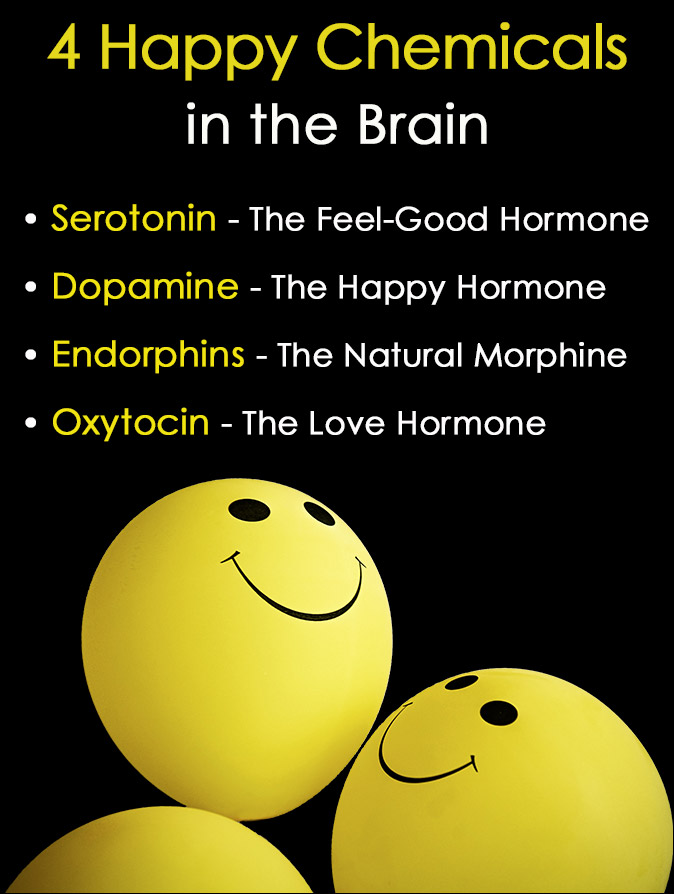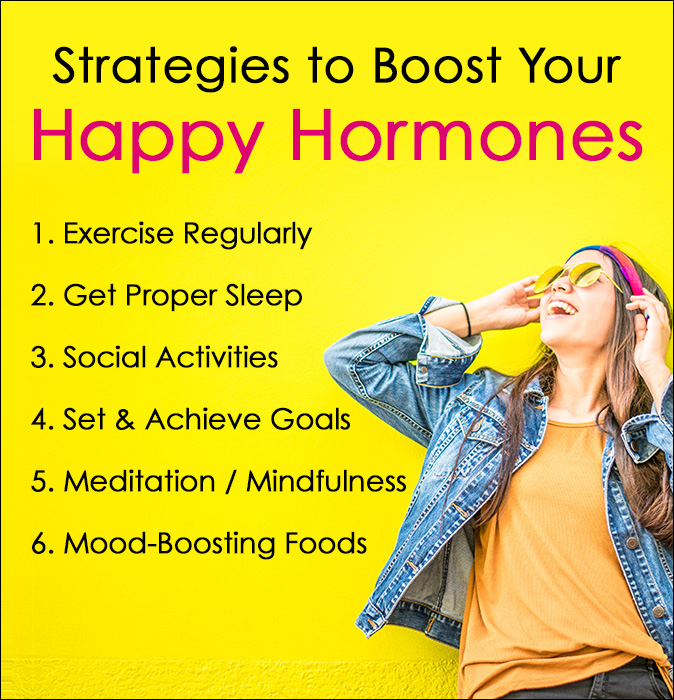
“Happiness Hormones” is a term used to describe to certain types of feel good happy chemicals in the brain.
These happiness chemicals play an important role in regulating mood and emotions and contribute to our feelings of happiness, pleasure, and positive mental health.
When a person’s brain chemistry is working properly, they feel happy and aren’t sidelined by life’s daily stressors.
On the other hand, when certain neurochemicals do not function as intended or an individual experiences low levels of happy hormones, it can lead to anxiety, depression, and unhealthy coping mechanisms.
For this reason, it’s necessary to understand the four main happiness chemicals in the brain and how to boost your happy hormones naturally to enhance overall well-being.
What are Hormones?
Hormones are your body’s chemical messengers that are similar to other chemicals in the body but they have slight differences.
Hormones
Hormones are produced by glands in the endocrine system (thyroid, adrenal glands, pancreas) and travel through the bloodstream to various tissues and organs.
They regulate essential functions such as metabolism, growth, and mood, and influence our emotional state and sense of well-being.
Hormonal responses usually travel a long distance in the body so they are generally slower and more prolonged than other chemicals, and they can take seconds to minutes to have an impact.
Neurotransmitters
These neurochemicals transmit signals between nerve cells (neurons) and the cells they target.
They are necessary for proper cell communication within the brain and the nervous system and affect areas of physiological and psychological functioning.
These chemicals travel shorter distances than other hormones so they act very quickly in a matter of milliseconds. The effects are usually much shorter though because they break down or become reabsorbed after transmitting a signal.
Neuropeptides are another type of chemical that share similar properties to the others. They travel a short distance yet they last longer.
What are the 4 Main Happiness Hormones?
The four main feel-good chemicals, often referred to as “happy hormones” are:
- Serotonin
- Dopamine
- Endorphins
- Oxytocin
Each of these happy chemicals can work alone or in combination with each other to regulate mood, pleasure, reward, motivation, social bonding, and promote happiness and mental health.
The good news is, there are easy and natural ways to increase the feel good effects of each one.
Unfortunately, many people use drugs or alcohol as coping strategies to feel the same effects. When that happens, it alters their natural mechanism of action and they stop working properly.
Engaging in healthy activities that naturally boost the production of these hormones can contribute to a positive and balanced emotional state.

Serotonin – The Feel-Good Hormone
Serotonin acts as a feel-good hormone and plays a vital role in mood stabilization. Ironically, the majority of this happy chemical is found in the gut instead of the brain.
Imbalances or low serotonin levels are often associated with mood disorders like depression and anxiety.
Serotonin promotes feelings of well-being, happiness, and also helps regulate sleep patterns and appetite.
Eating foods with serotonin is a natural way to improve your mood and increase serotonin levels.
Dopamine – The Happy Hormone
Dopamine is often called a “happy hormone” or “pleasure chemical” because of its connection to the brain’s reward system.
It is associated with motivation, pleasure, and reinforcement, which are all critical components of happiness.
Dopamine is released in response to rewarding stimuli and reinforces behaviors that are related to our well-being.
Ideas for how to increase dopamine include meditating, soaking in natural sunlight, and vigorous exercise.
Appropriate dopamine levels are linked to increased motivation and the drive to achieve goals.
However, because of its connection to the pleasure and reward system in the brain, dopamine is also closely linked to addiction and addictive behaviors.
Endorphins – The Natural Morphine and Mood Elevator
Endorphins are often referred to as the body’s morphine or natural painkiller, as well as mood elevator.
This happy chemical is known for boosting mood and feelings of euphoria, in addition to alleviating stress and pain.
Have you ever heard of a runner’s high? Running and vigorous exercise is a powerful trigger and one of the most effective ways to release endorphins naturally.
Oxytocin – The Love Hormone
Oxytocin is called the “love hormone” or “bonding hormone,” and is released during social interactions, when feeling trust or empathy, and while connecting with others.
Activities like hugging, physical touch, and social bonding are natural ways to boost this happy hormone.
Elevated levels are associated with increased trust and empathy towards others.
Learning how to increase oxytocin levels can have a profound impact on reducing stress and promoting a sense of calm and well-being.

Strategies to Boost Your Happy Hormones
After examining the functions of serotonin, dopamine, endorphins, and oxytocin, it’s necessary to identify ways to boost these happy hormones to improve mood, well being, and overall mental health.
1. Exercise Regularly
Regularly engaging in exercises and activities like running, swimming, or dancing can trigger the release of endorphins.
Strength and weight training can also increase dopamine levels and improve mood and motivation.
2. Get Proper Sleep
Consistently getting a good night’s sleep will support the production of serotonin and overall mental well-being.
3. Engage in Social Activities
Engaging in activities that promote social bonding and cultivate meaningful relationships helps to stimulate oxytocin release and enhances happiness.
4. Set and Achieve Goals
Setting tasks and achieving goals will reinforce positive behaviors and improve motivation by receiving the rewards of a dopamine boost. Make sure to celebrate all accomplishments to solidify the rewards.
5. Practice Mindfulness and Meditation
Practicing mindfulness techniques can positively impact serotonin levels and improve emotional happiness.
Meditation and deep-breathing exercises increase the release of endorphins and reduce stress and anxiety.
6. Include Mood-Boosting Foods
Consuming foods rich in omega-3 fatty acids can stimulate serotonin production and eating dark chocolate in moderation aids in releasing dopamine.
Understanding the role of the four happy hormones provides valuable insights into how we can influence our mood and emotional well-being.
By incorporating practical strategies into our daily lives, such as regular exercise, sleep, eating the right foods, and improving social connections, we can boost these happy chemicals in the brain and experience a more fulfilling and joyful life.
Related Posts
- Healthy and Happy Gut Equals a Happy Life
We need to talk about a Healthy Gut! There are many ways that we have…
- Wet Brain Syndrome Symptoms and Alcoholism Risks
Wet Brain Syndrome, also known as Wernicke-Korsakoff Syndrome (WKS), is a severe condition that occurs…
- Sober Happy Hour Alcohol-Free Way to Drink and Socialize
Sober Happy Hour is a growing movement to continue socializing while drinking alcohol-free drinks. And…
